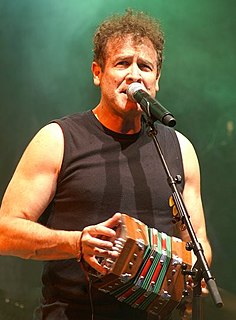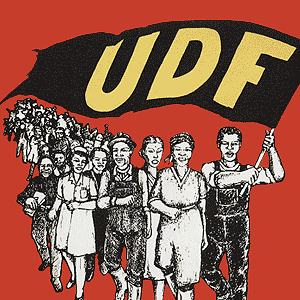Related Research Articles

Nadine Gordimer was a South African writer, political activist and recipient of the 1991 Nobel Prize in Literature. She was recognized as a woman "who through her magnificent epic writing has – in the words of Alfred Nobel – been of very great benefit to humanity".

Jonathan Paul Clegg, OBE, OIS was a South African musician, singer-songwriter, dancer, anthropologist and anti-apartheid activist, some of whose work was in musicology focused on the music of indigenous South African peoples. His band Juluka began as a duo with Sipho Mchunu, and was the first group in the South African apartheid-era with a white man and a black man. The pair performed and recorded, later with an expanded lineup.

Walter Max Ulyate Sisulu was a South African anti-apartheid activist and member of the African National Congress (ANC), serving at times as Secretary-General and Deputy President of the organization. He was incarcerated at Robben Island, where he served more than 25 years' imprisonment.

Oliver Reginald Kaizana Tambo, also known as O. R. Tambo, was a South African anti-apartheid politician and revolutionary who served as President of the African National Congress (ANC) from 1967 to 1991.

Christiaan Frederick Beyers Naudé was a South African cleric, theologian and the leading Afrikaner anti-apartheid activist. He was known simply as Beyers Naudé, or more colloquially, Oom Bey.
Anarchism in South Africa dates to the 1880s, and played a major role in the labour and socialist movements from the turn of the twentieth century through to the 1920s. The early South African anarchist movement was strongly syndicalist. The ascendance of Marxism–Leninism following the Russian Revolution, along with state repression, resulted in most of the movement going over to the Comintern line, with the remainder consigned to irrelevance. There were slight traces of anarchist or revolutionary syndicalist influence in some of the independent left-wing groups which resisted the apartheid government from the 1970s onward, but anarchism and revolutionary syndicalism as a distinct movement only began re-emerging in South Africa in the early 1990s. It remains a minority current in South African politics.

Apartheid was a system of institutionalised racial segregation that existed in South Africa and South West Africa from 1948 until the early 1990s. Apartheid was characterised by an authoritarian political culture based on baasskap, which ensured that South Africa was dominated politically, socially, and economically by the nation's minority white population. According to this system of social stratification, white citizens had the highest status, followed by Asians and Coloureds, then black Africans. The economic legacy and social effects of apartheid continue to the present day.

The United Democratic Front (UDF) was a major front for the ANC in the 1980s. The non-racial coalition of about 400 civic, church, students', workers' and other organisations was formed in 1983, initially to fight the new Tricameral Parliament. The UDF's goal was to establish a "non-racial, united South Africa in which segregation is abolished and in which society is freed from institutional and systematic racism." Its slogan was "UDF Unites, Apartheid Divides."

Dr David Webster was an academic and anti-apartheid activist. He worked as an anthropologist at the University of the Witwatersrand, where he was a senior lecturer at the time of his assassination.
TransAfrica is an advocacy organization in Washington, D.C. that seeks to influence the foreign policy of the United States concerning African and Caribbean countries and all African diaspora groups. They are a research, education, and advocacy center for activism focusing on social, economic and political conditions in Africa, the Caribbean, and Latin America and other parts of the African Diaspora. They are the largest and oldest social justice organization in the United States that focuses on the African world. They have served as a major research, educational, and organizing institution for the African and African Descendant communities and the U.S. public in general.

The environmental movement in South Africa traces its history from the early beginnings of conservation, to the rise of radicalism and activism amongst local ecologists. Before the Chernobyl disaster and the fall of the Berlin Wall, there were very few green activist groups in the country. Koeberg Alert and the Dolphin Action and Protection Group are probably two of the oldest post-conservation groups.
The National Union of South African Students (NUSAS) was an important force for liberalism and later radicalism in South African student anti-apartheid politics. Its mottos included non-racialism and non-sexism.

Disinvestmentfrom South Africa was first advocated in the 1960s, in protest against South Africa's system of apartheid, but was not implemented on a significant scale until the mid-1980s. The disinvestment campaign, after being realised in federal legislation enacted in 1986 by the United States, is credited by some as pressuring the South African Government to embark on negotiations ultimately leading to the dismantling of the apartheid system.
Nan Cross was a South African anti-apartheid and anti-conscription activist.

Internal resistance to apartheid in South Africa originated from several independent sectors of South African society and took forms ranging from social movements and passive resistance to guerrilla warfare. Mass action against the ruling National Party (NP) government, coupled with South Africa's growing international isolation and economic sanctions, were instrumental in leading to negotiations to end apartheid, which began formally in 1990 and ended with South Africa's first multiracial elections under a universal franchise in 1994.

The Landless People's Movement was an independent social movement in South Africa. It consisted of rural people and people living in shack settlements in cities. The Landless People's Movement boycotted parliamentary elections and had a history of conflict with the African National Congress. The Landless People's Movement was affiliated to Via Campesina internationally and its Johannesburg branches to the Poor People's Alliance in South Africa.
Sheena Duncan was a South African anti-Apartheid activist and counselor. Duncan was the daughter of Jean Sinclair, one of the co-founders of the Black Sash, a group of white, middle-class South African women who offered support to black South Africans and advocated the non-violent abolishment of the Apartheid system. Duncan served two terms as the leader of Black Sash.
The South African Congress of Democrats (SACOD) was a radical, left, white, anti-apartheid organization founded in South Africa in 1952 or 1953 as part of the multi-racial Congress Alliance, after the African National Congress (ANC) invited whites to become part of the Congress Movement.

Olivia Anne Marie Forsyth is a former spy for the apartheid government in South Africa. With the agent number RS407 and code name "Lara", Forsyth attained the rank of lieutenant in the Security Branch of the South African Police. Forsyth was recognised in intelligence circles as the apartheid government's "most outstanding spy" next to Craig Williamson, but was described by the African National Congress (ANC) as a "terrible, incompetent and inefficient spy".
The Foundation for the Community of Artists was founded in 1971 as a support organization for working artists. By 1988 its membership had grown to nearly 6,000, including artists, art workers and representatives of art organizations. Although the majority lived in the New York metropolitan area, there were members located throughout the nation. It remained active through the 1990s.
References
- ↑ Parks, Michael (9 May 1987). "Foreign Gifts Allowed for Apartheid Foes : Court Clears Way for United Democratic Front to Solicit Abroad". Los Angeles Times. Retrieved 17 September 2016.
- ↑ "The Five Freedoms Forum An Alliance of White Anti-Apartheid Organisations is Launched in Johannesburg". South African History Online. 16 March 2012. Retrieved 14 September 2016.
- ↑ Parks, Michael (2 May 1987). "S. African Election Poses Dilemma : Liberals Torn Over Whether to Vote or Abstain Next Week". Los Angeles Times. Retrieved 17 September 2016.
- ↑ "Five Freedoms Forum (FFF)". O'Malley: The Heart of Hope. Nelson Mandela Centre of Memory. Retrieved 17 September 2016.
- ↑ Battersby, John D. (28 September 1987). "Whites Back Move to End Apartheid". The New York Times. Retrieved 17 September 2016.
- ↑ "Anti-Apartheid Worker Killed". The New York Times. 2 May 1989. Retrieved 17 September 2016.